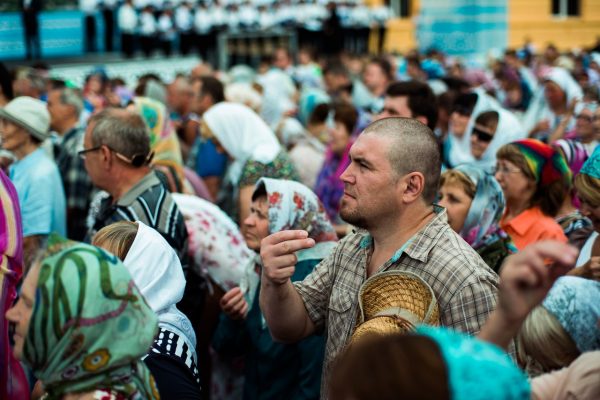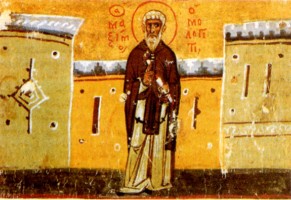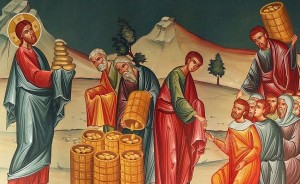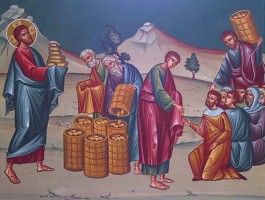St. Paul speaks to us today about unity and schism in the Church. How is this relevant to us? Increasingly, we see our society is polarized, that there are many things that divide us on moral and political grounds. Sadly, this is true even in the Church, where other sources of our identity, be they political, ethnic, or other, divide us from one another, causing great harm to our unity in the faith and the mission of the Church, hindering our healing in Christ, and leading many astray.
Division is nothing new to any society or, sadly, to the Church. Orthodox have faced it countless times before, even in the first century Church. The Seven Great Councils of the Church, and many more synods, were called through the centuries to deal with threats to the unity of the Faith, challenges to the timeless truth that is Christ and His revelation to us.
In today’s Epistle, for instance, St. Paul pleads with the brethren to be like-minded, to “speak the same thing,” that there may be “no divisions among you.” The word that he uses here to warn them in the original Greek is “skismata,” schism. St. John Chrysostom comments on this passage, saying, “the emphatic force of the word, ‘schism’… the name itself, was a sufficient accusation.” In other words, it was enough to put the fear of God in them so they’d take notice.
The ‘fear’ of being labeled ‘schismatics’ may seem strange to us today: after all, many are used to thinking that even as Christians we can believe whatever we want and still be considered a Christian, but in the early Church and throughout the Church’s history, being a schismatic, a “divider,” one who separates people from the Church and the truth of the Orthodox Faith in Christ, was on par with being a heretic, one who outright preaches or teaches doctrines or morality contrary to the Gospel. Both lead to ex-communication, separation from the koinonia, communion, with Christ and the Body, the Church—the ark of our salvation in Christ.
You can see how this “warning” would have made them pay attention. St. Paul wasn’t accusing them of being schismatics, but warning them that if their divisions and competing identities continued, and if they let those divisions into their communion with each other, that this was where it could lead—separateness from Christ, His Church, communion with each other.
Our culture’s values and beliefs are constantly changing; sadly, at this time, they’re not changing in the direction of Orthodoxy, but away from God’s truth. Those who stand in the way of so-called ‘progress’ are labeled by our culture ‘bigots,’ ‘narrow-minded,’ or worse.
Many of the Church’s teachings today stand in stark contrast to that which our culture thinks of as acceptable, good, or even laudable: abortion, practicing homosexuality and sex outside marriage, vulgarity, just to name a few of the many moral issues where dominant and vocal elements within our culture stand in opposition to the truth that God has revealed to us through Christ and His Church.
The pluralism of this culture divides us when we allow those forces to infiltrate the Church and change our beliefs from what God has revealed for our good—“the faith that was once delivered to the Saints (Jude 1:3). When that happens, we no longer share that same faith that unites us together with all other Orthodox believers around the world, as well as all our beloved ancestors in the faith with whom we also share communion. When we allow the temporal beliefs and identities of this particular time and culture to define us, we separate ourselves and each other from that eternal great communion with Christ and His Church.
The “glue” that holds us together as Orthodox believers is precisely the opposite of what our culture teaches: it’s not conformity to the culture, but holding ‘all things in common’ in the faith, which unites us. Our unity of faith means we can be united with Christ and with one another in the truth. In the Orthodox Church, we believe that the truth is a Person, Jesus Christ, God’s revelation to us of Himself and the way of salvation. Through our profession and our striving to live the truth that Christ is, we’re united to Him as we partake of the Sacraments and the life that is in Him alone. He is the same yesterday, today, and forever. We as Orthodox are the inheritors and evangelists of that revelation of healing for us, for all mankind. Only in this way, can we fulfill Christ’s high priestly prayer to the Father in which Christ pleads that we “may all be one” so that “the world may believe that You sent Me” (John 17:21).
Contrary to those who see the Church as a divider for not changing with the times, the Church is in reality the upholder of unity among people. The Church calls us all into this communion of love and life with God the Holy Trinity—regardless of race, gender, political preferences, ethnicity, culture, time, geography—whatever otherwise divides secular humanity. In Christ we’re all called into unity with each other by virtue of this new identity, our new relationship with God and with one another. We’re all invited into a loving relationship with the God of the universe, Who made all things, Who sustains all things.
Submitting ourselves to Christ and the Church means that even while we may wrestle or struggle with aspects of the Faith or the Church’s teachings, we do so while humbly submitting ourselves to it, praying for deeper understanding, because we know the testimony of countless who have come before us is true. We can see through their testimony that this is the way that leads to life, the way of healing for our souls, for salvation.
We’re called as Orthodox Christians to love our so-called ‘enemies,’ our persecutors, those who hate us, those who would divide us, those who think they can divide the Truth, the Person of Jesus Christ. We love by standing up for the Truth that is Christ, we love by calling all to the repentance we ourselves are also called to. Christ sets us free from our delusions, our divisions, our humanistic ways, which instead of leading mankind to “progress,” actually lead us further away from God, His love, His life-saving morality, and the blessed life of the Kingdom.
The Orthodox Church has seen empires, heretics, schismatics come and go, she’s weathered Arianism, Islam, Communism, and every other ‘ism’. And she will weather secular humanism and postmodernism as well until the end of the age, but at a cost.
The cost is the cross that you and I must take up, dying to self, bearing our burdens and entrusting them to God, heroically battling our sins and passions; it is both a personal and a corporate cross. We die to our wants, we die to the culture’s hold on us, we battle whatever may entice us away from our communion with God and each other. Taking up this cross is how we love God, our neighbor, our people. And it is the only means through which this culture can be baptized, that is, through Christ.
The baptism and transfiguration of our culture can happen, if we, the Orthodox Christians in this land, stand together, united, prayerful, humbly articulating and living to the best of our abilities and with God’s help, the timeless Truth of Christ as He’s revealed it to His holy Church. It begins with us taking up our cross: repenting ourselves of our sins, striving to live authentic Christian lives of integrity, growing this and other missions, prioritizing our worship life together. In these ways, we witness to the vibrant truth of the Gospel and the Orthodox Faith, we witness to the Truth that is Christ and the life that is only in Him. In this way, we love as Christ loves, bringing others to the same knowledge and love of God we hold so dear while also keeping in mind those closing words of St. Paul, “the message of the cross is foolishness to those who are perishing, but to us who are being saved it is the power of God.” The same God who fed the 5,000 and healed their diseases is alive and at work in you and in me to His glory.




















